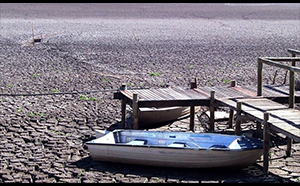Climate Change and Destruction of Natural Resources
The Earth's climate has changed throughout history. What about now? You have the power, there are several things that you can do.
Just in the last 650,000 years there have been seven cycles of glacial advance and retreat, with the abrupt end of the last ice age about 7,000 years ago marking the beginning of the modern climate era — and of human civilization. Most of these climate changes are attributed to very small variations in Earth’s orbit that change the amount of solar energy our planet receives.
The current warming trend is of particular significance because most of it is extremely likely (greater than 95 percent probability) to be the result of human activity since the mid-20th century and proceeding at a rate that is unprecedented over decades to millennia.
The heat-trapping nature of carbon dioxide and other gases was demonstrated in the mid-19th century. Their ability to affect the transfer of infrared energy through the atmosphere is the scientific basis of many instruments flown by NASA. There is no question that increased levels of greenhouse gases must cause the Earth to warm in response.
Ice cores drawn from Greenland, Antarctica, and tropical mountain glaciers show that the Earth’s climate responds to changes in greenhouse gas levels. Ancient evidence can also be found in tree rings, ocean sediments, coral reefs, and layers of sedimentary rocks. This ancient, or paleoclimate, evidence reveals that current warming is occurring roughly ten times faster than the average rate of ice-age-recovery warming.
Get Involved
Take a few minutes to contact your political representatives and the media to tell them you want immediate action on climate change. Remind them that reducing greenhouse gas emissions will also build healthier communities, spur economic innovation and create new jobs. And next time you’re at the polls, vote for politicians who support effective climate policies.
Be Energy Efficient
You already switch off lights — what’s next? Change light bulbs to compact fluorescents or LEDs. Unplug computers, TVs and other electronics when not in use. Wash clothes in cold or warm (not hot) water. Dryers are energy hogs, so hang dry when you can. Install a programmable thermostat. Look for the Energy Star® label when buying new appliances. And a home energy audit is cheaper than you think.
Switch To Clean Energy
When we get electricity from renewable energy sources like wind and solar power, we avoid the carbon dioxide emissions that would have come from burning fossil fuels like coal, oil, or natural gas.
Eat Wisely
Buy organic and locally grown foods. Avoid processed items. Grow some of your own food. And eat low on the food chain — at least one meat-free meal a day — The share of greenhouse gas emissions from animal agriculture is usually pegged at 14.5 percent to 18 percent, but the Worldwatch Institute found lots of oversights in those calculations that, when properly counted, bring the ag contribution all the way up to 51 percent. That, you’ll notice, is more than half. Which means that after we clean up all the transportation, energy, industry and commerce in the world, we’ve done less than half the job. The other half is meat and dairy. Refuse to eat it. If this seems too challenging, consider giving it up one day a week. It will still be the most important action you can take.
Trim Your Waste, Reuse and Reduce
Garbage buried in landfills produces methane, a potent greenhouse gas. Keep stuff out of landfills by composting kitchen scraps and garden trimmings, and recycling paper, plastic, metal and glass. Let store managers and manufacturers know you want products with minimal or recyclable packaging.
Reduce and reuse before recycle. Recycling emerged as a virtue before we knew we had a climate problem, and it turns out that transporting and processing materials for recycling is carbon intensive. Recycling still uses less energy than making new products from scratch, but reducing and reusing are even cleaner.
Let Polluters Pay
Carbon taxes make polluting activities more expensive and green solutions more affordable, allowing energy-efficient businesses and households to save money. They are one of the most effective ways to reduce climate impact.
Green Your Commute
Transportation causes about 25 percent of greenhouse gas emissions, so walk, cycle or take transit whenever you can. You’ll save money and get into better shape! If you can’t go car-free, try carpooling or car sharing, and use the smallest, most fuel-efficient vehicle possible.
See! It's not hard to be a hero.
Suggested Videos & Documenteries
Climate Change Explained
Our Future: Narrated by Morgan Freeman
Related links & sources

Climate Change and Destruction of Natural Resources
The Earth's climate has changed throughout history. What about now? You have the power, there are several things that you can do.

Obesity
Overweight and obesity are defined as abnormal or excessive fat accumulation that may impair health.

Malnutrition & Vitamin Deficiencies
Malnutrition is estimated to contribute to more than one third of all child deaths, although it is rarely listed as the direct cause.

Large Scale Conflict and Wars
38.9 percent of those polled ranked the possibility of large-scale war as the most serious global issue.

Water Crisis
All life on Earth needs water to exist, however fresh water consumption is increasing at an unsustainable rate causing irreversible damage. The fresh water shortages occurring can become globally catastrophic.

Smoking Tobacco & Nicotine Addiction
Nearly 6 million people die of tobacco-related diseases each year, including more than 600,000 nonsmokers who are exposed to secondhand smoke. Smoking has become an extensive epidemic.

Sex/Human Trafficking
Many people would say slavery ended after the emancipation of the slaves in 1865, but human slavery still exists today in the form of human/sex trafficking.

Unemployment
Employment is central in our lives. However the issue of unemployment is a major setback to the majority of the countries.

Education Inequalities
A massive amount of people on this globe do not have resources that allow them access to education, and a majority of them are children in unprivileged societies.

Alcoholism
Alcoholism is the inability to control alcohol consumption due to a physical and emotional dependence. Regardless of the severe consequences that accompanies alcoholism, eliminating it is an extreme challenge.

Orphans
Not everyone is called to adopt, but everyone can do something. Here are four great ways to engage your family in showing hope!

Violence Against Women & Child Abuse
Violence against women and children is a serious public health concern, with costs at multiple levels of society.
